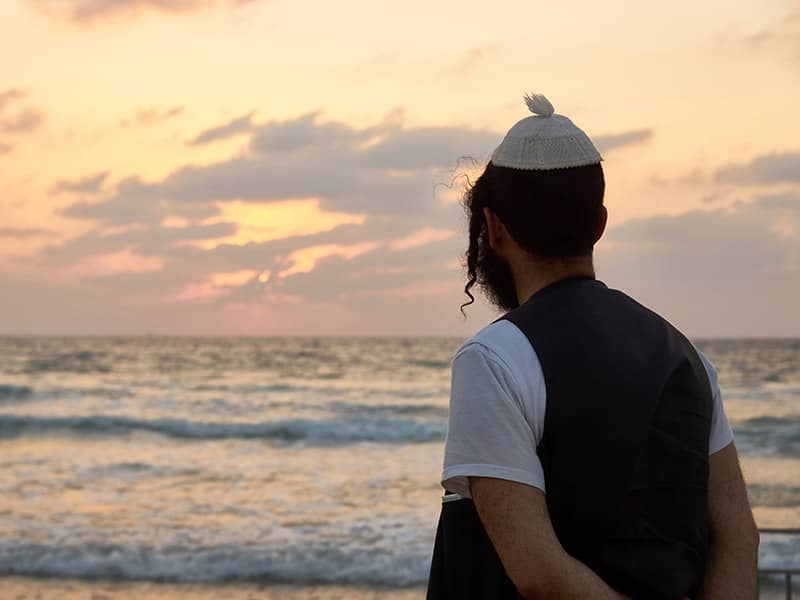"While we didn't get everything we wanted, this is a great day for Jewish mothers everywhere," said MAIM president, Sophie Berkowitz, who tragically lost her daughter to a marriage with a Southern Baptist fireman in Houston seven years ago and hasn't heard from her since. "The court has gone a long way toward removing the stigma against Jews marrying Jews."
While not quite illegal, marriages between Jews of the opposite sex are so rare that they've become an underground activity, facing a larger culture that scorns and discriminates against Jewish couples who are determined -- against all odds -- to marry each other. Their weddings are often furtively held inside secret meeting-places known as "temples" and involve ancient rites peculiar to their subculture, such as stepping on a glass at the end of the ceremony or placing the couple's gift registry at Nieman-Marcus.
Still, some Jewish couples are finally willing to go public with their forbidden love for each other. "We're tired of being treated like second-class citizens," notes Paul Daviwitz, 34, of Richmond, Virginia, who married his wife Ruth after a 10-year search for a Jewish woman he felt comfortable marrying. "We didn't settle for each other; I happen to like women with frizzy hair. Do you got a problem with that?" Now, following by a few days the Massachusetts court ruling upholding the right of gay marriages, Jews who marry Jews are also finding vindication in the California court decision.
Even so, tremendous cultural and demographic barriers remain before Jewish same-religion marriages become commonplace or widely accepted. Perhaps the major obstacle facing proponents of intra-Jewish marriages is the frequency with which Jewish men and women are attracted to good-looking people of other faiths.
As Groucho Marx stated years ago, "It always seemed to me that making love to a Jewish girl was like making love to your sister." That sort of deeply-held belief is hard to break, experts note. (They also say that Jewish women are governed by their own set of stereotypes, all too often preferring handsome non-Jewish athletes to the prototypical "shlub.")
The demographic trends are also stacked against intra-Jewish marriages. Jews currently make up less than 2 percent of the American population and nearly half (and sometimes more) marry outside their faith, depending on geographic location and the availability of blonde actresses. In Hollywood, no prominent Jew has married another since Steven Spielberg married Amy Irving in 1985. His $100 million divorce settlement when he decided to marry golden-tressed Kate Capshaw has had a chilling effect on other same-religion marriages among leading Jews, according to the B'Nai B'rith Jewish Anti-Assimilation League.
To counter the intermarriage trend, though, some Jewish groups are fighting back, working from the same playbook as Christian fundamentalists who promote "conversion therapy" for gays. Rabbi Louis Sheldonberg of the Traditional Jewish Values Coalition is the author of the new book, "Living Without Shiksas: A Guide to Jewish Fulfillment". Formerly married to a University of Montana homecoming queen, he says he's found renewed happiness and faith in his new all-Jewish marriage. "I'm a better man for being married to a Jewish woman I love and resisting temptation to stray," he says.
His controversial workshops are aimed at Jewish men and women who are ashamed of their attraction to non-Jews. They feature the use of mild electric shocks administered in conjunction with the display of pictures of gorgeous non-Jewish icons such as Pamela Anderson and Brad Pitt. At the same time, those images are gradually replaced by stirring video footage of charismatic stars of Jewish heritage, such as Lauren Bacall and Harrison Ford (his mother was Jewish, they're reminded) and the program's show-stopper, the half-Jewish Winona Ryder, born Winona Horowitz. "We've found that Winona is a powerful stimulant to the male Jewish brain," says Sheldonberg.
Unfortunately, he concedes, nearly 70 percent of the Jewish Jewphobes he serves "relapse" and ultimately marry non-Jews. It's unclear, then, if the new California court ruling will have much practical effect in stemming the intermarriage tide.

